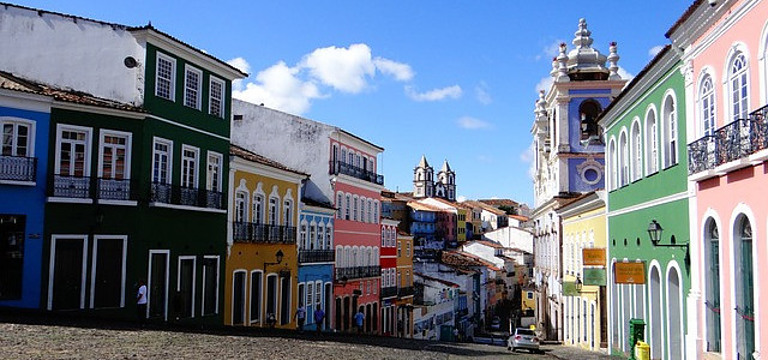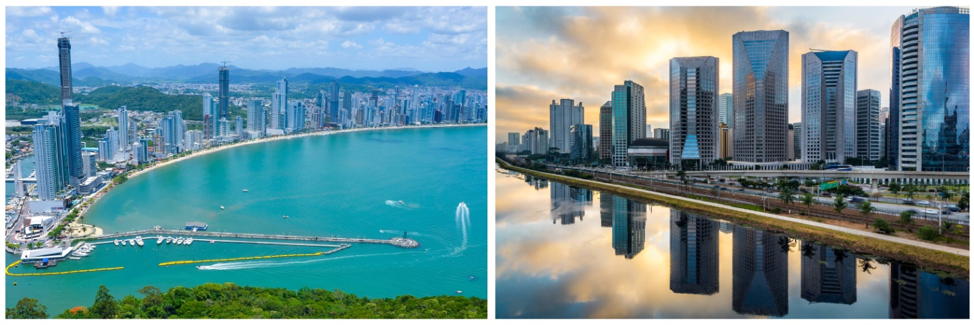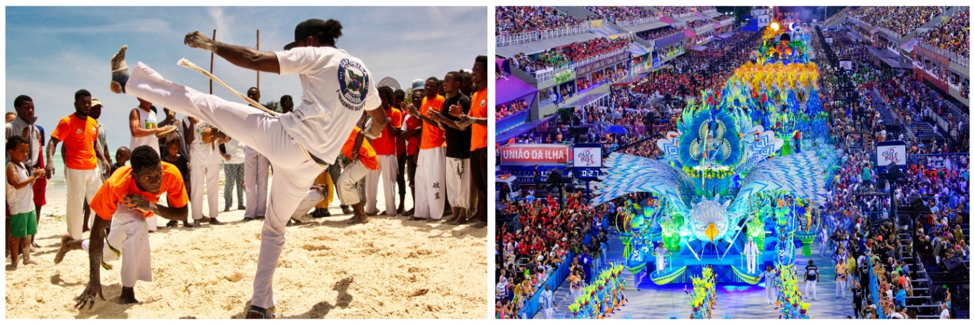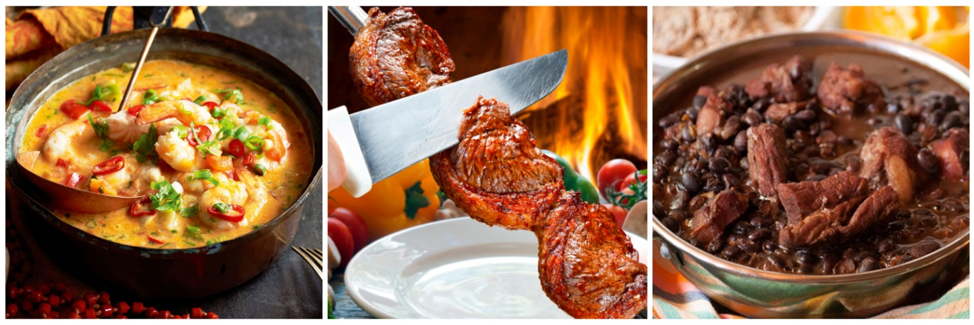
Learning a new language can be an exciting and challenging experience that opens doors to new opportunities and perspectives. And if you’re looking to learn a language that’s both culturally rich and in high demand, Brazilian Portuguese may be just what you’re looking for. With over 250 million speakers worldwide, Brazil’s thriving economy and diverse culture make it a fascinating and rewarding destination for language learners. So, why learn Brazilian Portuguese? Here are just a few reasons:
Work Opportunities
Being the largest country in Latin America and the ninth-largest economy in the world, Brazil offers many opportunities for businesses to expand into the country, as it has a diverse economy that spans several industries. Fluency in Portuguese can help you communicate with clients in the region. This can be a valuable asset in today’s increasingly competitive job market, opening up new work opportunities and improving your chances for career advancement and financial stability, as companies offer a salary premium for employees who speak a second language, especially one that is in high demand like Brazilian Portuguese. Another aspect to be considered is the rise of remote work. Being able to effectively communicate with customers and clients in different countries is becoming increasingly important in today’s globalized and interconnected world. Learning Brazilian Portuguese allows you to position yourself to work remotely for companies that have a presence in Brazil, as well as work with Brazilian clients and partners, which can be a massive differential, offering you greater flexibility and higher earnings.

Brazil is an economic powerhouse that shines brightly in the South American landscape, boasting a thriving and diversified economy. Brazil is not only the largest country in the region but also one of the fastest-growing economies on the global stage, with a GDP nearing 2 trillion dollars. Its success can be attributed to a variety of factors, including its rich natural resources and innovative industries. The country boasts a rapidly growing startup ecosystem, with innovative companies emerging in areas such as fintech, e-commerce, and healthcare. Brazil is expected to play a crucial role in the global economy in the 21st century and the country’s international notoriety has seen a boom in the last decade as well, having recently hosted the World Cup (2014) and the Olympics (2016).

Travel
Brazil is a country with a unique blend of cultures and landscapes, which makes it a fascinating destination to explore. From the bustling cities to the tranquil beaches and unmatched natural beauties, there’s a multitude of sceneries and culturally rich spots to explore and experience. The Brazilian people are warm and friendly, and they’ll welcome you with open arms; however, according to a report by the British Council, only about 5% of Brazilians are proficient in English, so in order to connect with them and fully immerse yourself in the Brazilian experience, learning Portuguese is essential.
Brazil has it all – from Lençóis Maranhenses’ sand dunes and lagoons to Rio de Janeiro’s stunning beauty and famous nightlife. Wildlife lovers can explore Pantanal, while São Paulo boasts a cultural and financial center. Admire Cataratas do Iguaçu’s waterfalls or dive in Atol das Rocas’ marine reserve. Maceió has beautiful beaches, and Bonito offers adventure activities. To name a few more, there’s also Monte Roraima, Cerrado, Brasília, Bonito, Águas Quentes, Fernando de Noronha, Angra dos Reis, Balneário Camboriú, Chapada dos Veadeiros, Poço Encantado, Atol das Rocas, Amazônia, Abrolhos, Florianópolis, Niteró, Ilha Grande and the list goes on.
No matter how hard we try, words cannot do Brazil’s divine beauty justice. You really have to see it with your own eyes to fully grasp it!

Culture
Brazil is known for its diverse culture, rich history, and vibrant arts scene. It has a phenomenally rich and diverse cultural heritage that reflects its complex history, geography, and ethnic makeup. Learning Portuguese allows you to fully engage and immerse yourself in that cultural mosaic, created from the interactions of indigenous communities and descendants of Europeans, Africans, and Asians, to create world renowned cultural marvels such as Capoeira, a martial art and dance form that is characterized by acrobatic movements often accompanied by music and singing. Brazilian music is also a vibrant and diverse blend, with styles ranging from Samba to Bossa Nova to Funk Carioca. And how could we forget about the world-renowned Brazilian Carnival, commonly called the “biggest party on the planet” by locals?

You can also unearth a plethora of hidden treasures in Brazil, including lesser-known jewels like Cordel and its extensive, intricate folklore. Among the enigmatic and captivating characters that populate this universe are Curupira, Saci Perêrê, and Iara. All that fused together to create a cultural landscape of unparalleled diversity and opulence.
Portuguese is also a gateway to unlocking other Romance languages, being tightly related to Spanish, Italian, French, Catalan and Romanian. By learning Brazilian Portuguese, you will gain a deeper understanding of the grammar and vocabulary of these languages, making it easier to learn them in the future. In fact, Spanish is so closely related to Portuguese that speakers of both languages can usually communicate with ease, even if they don’t speak each other’s languages. The blend of Portuguese and Spanish used in these interactions is jokingly called “Portuñol”.
PortuguesePod101.com is a fun and innovative way to master the Portuguese language at your own leisure and speed while immersing yourself in Brazilian culture.

Some of the links on this site are affiliate links, which means we may earn a small commission if you make a purchase using the link. This commission comes at no additional cost to you and helps to support the maintenance and development of this website.
Improved Cognitive Skills and Personal Growth
Did you know that learning multiple languages has incredible benefits for our brains? It’s true! Not only can it make certain parts of the brain more dense, but it can also activate specific areas when we use a second language. And get this – because the brain is constantly working to switch between languages, it may even delay the onset of Alzheimer’s and dementia by up to five years!
Recent studies by experts have proven that bilingualism can have some significant cognitive advantages. For example, it could strengthen the dorsolateral prefrontal cortex – which is an essential part of the brain responsible for tasks like problem-solving, executive function, task-switching, and filtering out irrelevant information. Learning a new language can be an extremely rewarding experience, helping you expand your horizons. Additionally, speaking Portuguese can open up new social and cultural opportunities, and allow you to connect with people from all over the world, as Portuguese is spoken by over 250 million people worldwide. Speaking Portuguese means more high-quality music, films, books, and culture. It means more life.
Cuisine
Welcome to the vibrant world of Brazilian cuisine! The flavors of Brazil are a captivating blend of culture, history, and geography. The fusion of diverse culinary traditions from around the world has given birth to a deliciously eclectic cuisine that is uniquely Brazilian. Every dish is infused with an irresistible blend of spices and seasonings, and crafted to perfection with the freshest ingredients.
Feijoada, the iconic black bean and meat stew, is a national treasure created by African slaves in Brazil and a must-try for anyone who craves a hearty meal. And who can resist the mouth-watering aroma of churrasco? The famous Brazilian barbecue, whose most famous variant is the South’s own fogo de chão. Meanwhile, on the other side of the country, all the way from the the lands of Bahia, we have the world renowned moqueca. Made with fish, coconut milk, tomatoes, onions, bell peppers, and seasoned with dendê oil and herbs.

But the magic doesn’t stop there. There’s also acarajé, a crunchy and flavorful fried bean cake and coxinha, a heavenly pastry filled with chicken or melted cheese. And for those of you that prefer sweet over salty, there’s the local favorite brigadeiro. This dessert, made from a few simple ingredients such as condensed milk, cocoa powder, butter, and chocolate sprinkles is commonly served at birthday parties, weddings, and other special and commemorative occasions. It’s an absolute favorite for most Brazilians.

Conclusion
Whether you are interested in advancing your career, traveling and connecting with people, or just passionate about language learning in general, Brazilian Portuguese has much to offer you. So why not start right away? Bora aprender!
Are you ready to take your Portuguese to the next level? Check out this link for a list of resources to help you improve your skills and achieve your language goals.
Written by Vinícius Lutterbach
Over 250M people who speak this language? That’s impressive! I love the idea that learning a new language has the potential to stimulate our brains. Spanish is my mother language and I’ve seen that there are quite some similarities between the two, so that makes me more eager to start learning Brazilian Portuguese.
Hola Stephanie, gracias por tu comentario! Portuguese is one of the most widely spoken languages in the world. It’s worth noting that Portuguese has several regional variations, including Brazilian Portuguese, European Portuguese, and African Portuguese, among others. Portuguese and Spanish have a lot in common in terms of vocabulary and grammar. Since Spanish is your mother tongue, there is no doubt that you will be able to pick up Portuguese quickly if you decide to learn the language one day, which I hope you do!
Thank you for sharing your article on the benefits of learning Portuguese. As someone who has been interested in learning a new language, I found your insights on the practical and cultural advantages of learning Portuguese to be very informative.
One question that came to mind as I read your article is whether there are any differences between Brazilian Portuguese and European Portuguese in terms of grammar or vocabulary, and how these differences might affect someone who is learning the language. Do you have any insights or recommendations on this topic?
There are some differences between Brazilian Portuguese and European Portuguese in terms of grammar, vocabulary and pronunciation. Brazilian Portuguese has a higher number of loanwords from indigenous languages and African languages. In addition, vowels in Brazilian Portuguese are generally pronounced more openly and relaxed than in European Portuguese. For example, the “e” sound in “mesa” (table) is pronounced more like “eh” in Brazil, while in Portugal it is pronounced more like “ay” or “ai”. The pronunciation of some consonants can also differ. For example, in European Portuguese, the “s” sound is often pronounced like “sh” at the end of a word, while in Brazilian Portuguese it is often pronounced like “s.” It really depends though because there can be variation within a specific region or dialect, even within a country. If you want to learn Portuguese and deciding between Brazilian or European, you should think about your own personal (or professional) interests and which one would be most helpful and fulfilling to you.
Wow I had now idea I am from Texas, and we have allot of Spanish speaking residents here in Texas I have always wanted to learn Spanish now I have one more language to add too my list things I would love to learn. You gave a lot of useful information here and really have a lot of info here for anyone to go off this is a great article. You should be proud of this work and your media is all in the right spots. If it were me, I wouldn’t change a thing. Now with that said I’m guessing this would help me learn spanish as well? If so, tell me what you think?
Thank you for your kind words! I’m glad that you found the information in the article to be useful. Learning a new language can be a very rewarding experience, and I think it’s great that you’re interested in adding Spanish, which has many similarities to Portuguese, to your list of languages to learn. Both languages are Romance languages and share some similarities in vocabulary and grammar. A lot of the information in this post can also be applied to Spanish speaking countries as well!